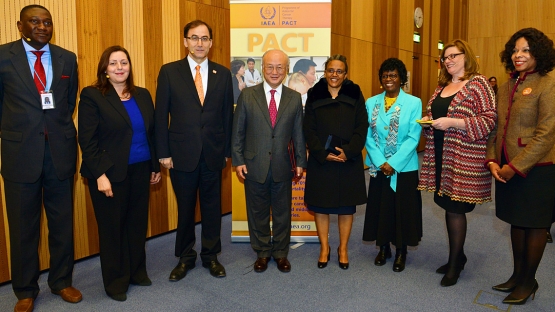Cancer is preventable and increasingly curable, but to fight the disease in low and middle income countries requires international collaboration and resources. This was the conclusion of the high-level panel discussion organized by the IAEA to mark World Cancer Day on 4 February.
Roman Tesfaye, the First Lady of Ethiopia, joined IAEA Director General Yukiya Amano and a panel of expert speakers to discuss ways to improve the chances of survival for the 5 million people who die of cancer every year in low- and middle-income countries.
Speakers highlighted the results of ongoing efforts in effective cancer control and encouraged future global action in fighting cancer. They highlighted the importance of equity, accessibility, affordability and quality. Raising public awareness about cancer, ensuring quality in cancer control, and providing properly trained experts in medical facilities will go a long way towards achieving these goals, the panel agreed.
Partnerships Are Key: IAEA Director General
"It will take a concerted effort by all of us to ensure that, before too long, all countries enjoy access to the highest standards of cancer care," said IAEA Director General Yukiya Amano during his opening remarks. "I firmly believe that this is 'Not Beyond Us', but it will require commitment, resources and focused partnerships, to reach that point. And it will take time," he said.
Mr Amano highlighted that the IAEA supports some 160 cancer projects around the world through its technical cooperation programme, and helps countries to establish oncology and radiotherapy centres, provides extensive training for medical and technical staff, and supports the establishment of nuclear medicine facilities for diagnostics.
Ms Tesfaye remarked that cancer has reached epidemic proportions worldwide. Moreover, 70 per cent of the world's cancer deaths occur in low- and middle-income countries, she said. In many African countries there is only one cancer treatment center serving populations of millions of citizens, while many other countries lack treatment centers altogether. There is a shortage of properly trained specialists and a lack of technology, she said. "These issues have not been addressed adequately in the past," Ms Tesfaye said.
Cancer Destroys Economies, As Well As Lives
The devastating consequences of cancer for humanity are indisputable, said Nelly Enwerem-Bromson, Director of the IAEA Programme of Action for Cancer Therapy (PACT). "By now the threat that cancer poses to global socioeconomic development is well recognized," Ms Enwerem-Bromson said. "Yet we also recognize that solutions do exist across the continuum of cancer care and control. With global action, innovative partnerships, technologies, and financing these solutions are indeed not beyond us."
Single organizations or governments cannot adequately address the cancer crisis, said Doyin Oluwole, Executive Director of the Pink Ribbon Red Ribbon foundation. "We need collective expertise to fight cancer," she said. Pink Ribbon Red Ribbon is a public-private partnership aimed at catalyzing the global community to reduce deaths from cervical and breast cancer in sub-Saharan Africa by raising awareness of these diseases and increasing access to quality services to detect and treat them.
Tezer Kutluk, President of the Union for International Cancer Control, said that almost half of the 5 million people who die from cancer every year in developing countries could be saved. He pointed out that investing in cancer care is not only the right thing to do, but also makes economic sense. "If we do not act now, there is the cost of inaction. At the moment cancer treatment costs around 450 billion dollars per year. But if we do not take action, by 2025 the economic losses will exceed 7 trillion dollars in low and middle income economies."
Kennedy Lishimpi, Executive Director of Cancer Diseases Hospital in Zambia, pointed to the important role the IAEA has played in improving cancer care in his country, by raising awareness and opening the first cancer treatment center in Zambia in 2007. "Governments need to ensure access to adequate cancer care and make these facilities available to all citizens," he said.
Accessibility in Cancer Control is Crucial
Although the cost of radiotherapy equipment is high, it is still one of the most cost-effective cancer treatment options, said Ms Abdel-Wahab, Director of the Division of Human Health at the IAEA. "Even though the initial cost of the machine can be significant, over time it becomes very cost-effective," she said, referring to the 10-15 years of operational lifetime of the machines.
Training doctors, nurses, technicians and other specialists is an important part of the mix required for sustainable cancer care, she said. "The costs of human resource capacity building cannot be underestimated," Ms Abdel-Wahab said, "and donors need to provide adequate financing not only for equipment but also for training. We need to plan ahead and prepare well."
The IAEA has launched a cost effective tool for the remote training of health professionals, she added. The IAEA Human Health Campus offers interactive online training courses in radiation oncology, physics, nutrition and nuclear medicine, she told the audience.
In her closing remarks, Ms Enwerem-Bromson underlined that PACT helps countries to use their limited resources efficiently and effectively by ensuring that radiation therapy is integrated into comprehensive national cancer control plans. In cooperation with its partners, PACT also aims at raising global awareness about the importance of comprehensive cancer control and mobilising donor support where it is needed most


